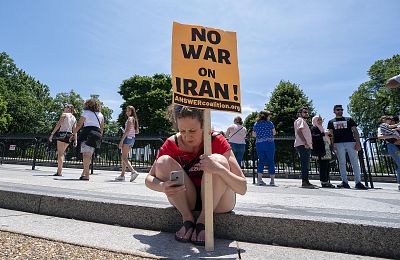President Donald Trump may have called off the airstrikes — for now — but tensions between the United States and Iran looked set to ramp up elsewhere.
President Donald Trump may have called off the airstrikes but tensions between the United States and Iran looked set to ramp up elsewhere Monday.
The United States is set to start the week by announcing "significant" sanctions, while Iran said it could shoot down another U.S. drone if necessary.
This was after its strike on an American surveillance aircraft last week brought the countries to the brink of a military confrontation, with Trump calling off retaliatory airstrikes with 10 minutes to spare.
"Everyone saw the downing of the unmanned drone," Iran's navy commander, Rear Admiral Hossein Khanzadi, told the Tasnim news agency, according to a translation by Reuters. "I can assure you that this firm response can be repeated, and the enemy knows it."
Meanwhile, an adviser to the Iranian president said his country would not enter into negotiations with the U.S. unless it lifts sanctions, which were reimposed by Trump after he withdrew from the landmark nuclear deal signed under the administration of President Barack Obama in 2015.
Iran was complying with the deal's terms, which limited its nuclear activities in return for lifting international sanctions. Trump has always hated the deal, saying it did not properly address Iran's growing influence in the region and ballistic missiles program.
On Monday, Hesameddin Ashena, an adviser to President Hassan Rouhani, tweeted that if the U.S. expects Iran to go beyond its terms of this deal, Washington too must offer concessions of its own.
"U.S. offer for negotiations with no precondition is not acceptable while sanctions and threats continue," Ashena wrote, according to a Reuters translation. "If they want something beyond the JCPOA, they should offer something beyond the JCPOA; with international guarantees," he added, referring to the nuclear deal's official name, the Joint Comprehensive Plan of Action.
Under Trump, the U.S. military has drastically stepped up its secret hacking of foreign computer networksin a new effort to keep Iran and other countries, such as China and Russia, on their heels, current and former U.S. officials have told NBC News.
However, Iran's telecoms minister said that while the U.S. had launched a long-planned cyber attack to disable his country's rocket launch systems — this was unsuccessful.
"They try hard, but have not carried out a successful attack," Mohammad Javad Azari Jahromi, Iran's minister for information and communications technology, said on Twitter, according to a translation by Reuters.
The tensions looked set to dominate Secretary of State Mike Pompeo's visit starting Monday to Saudi Arabia, one of Iran's regional enemies.
Pompeo met with the Saudi King Salman although their discussion was closed to the press. The secretary of state told reporters ahead of his trip Sunday that "significant" sanctions would be announced against Iran, adding to those that the U.S. says are already squeezing its economy.
"We are going to deny them the resources they need" to allegedly fund militant groups in the region, "thereby keeping American interests and American people safe all around the world," Pompeo said.
The secretary of state is also expected to meet Crown Prince Mohammed bin Salman in the Saudi city of Jiddah, before heading to Abu Dhabi, the United Arab Emirates, another close U.S. ally and partner.
Meanwhile, John Bolton, the national security adviser, was in Israel, another of Iran's staunch foes, saying that the airstrikes Trump halted could be revived if necessary, and that no one had given Iran a "hunting license in the Middle East."
Tensions between Washington, its allies and Tehran have soared under the Trump administration. In the past two months, six oil tankers have been sabotaged in the Gulf of Oman, something the U.S. and Saudi Arabia blame squarely on Iran, which has in turn denied any involvement.
That came to a head last week when Iran shot down a U.S. surveillance drone. It said the aircraft was in its airspace, the U.S. claims it was in international airspace.
The incident saw Trump call of airstrikes on three Iranian targets with 10 minutes to spare, a decision he said was motivated after he was advised it was estimated 150 people would die in the operation.












